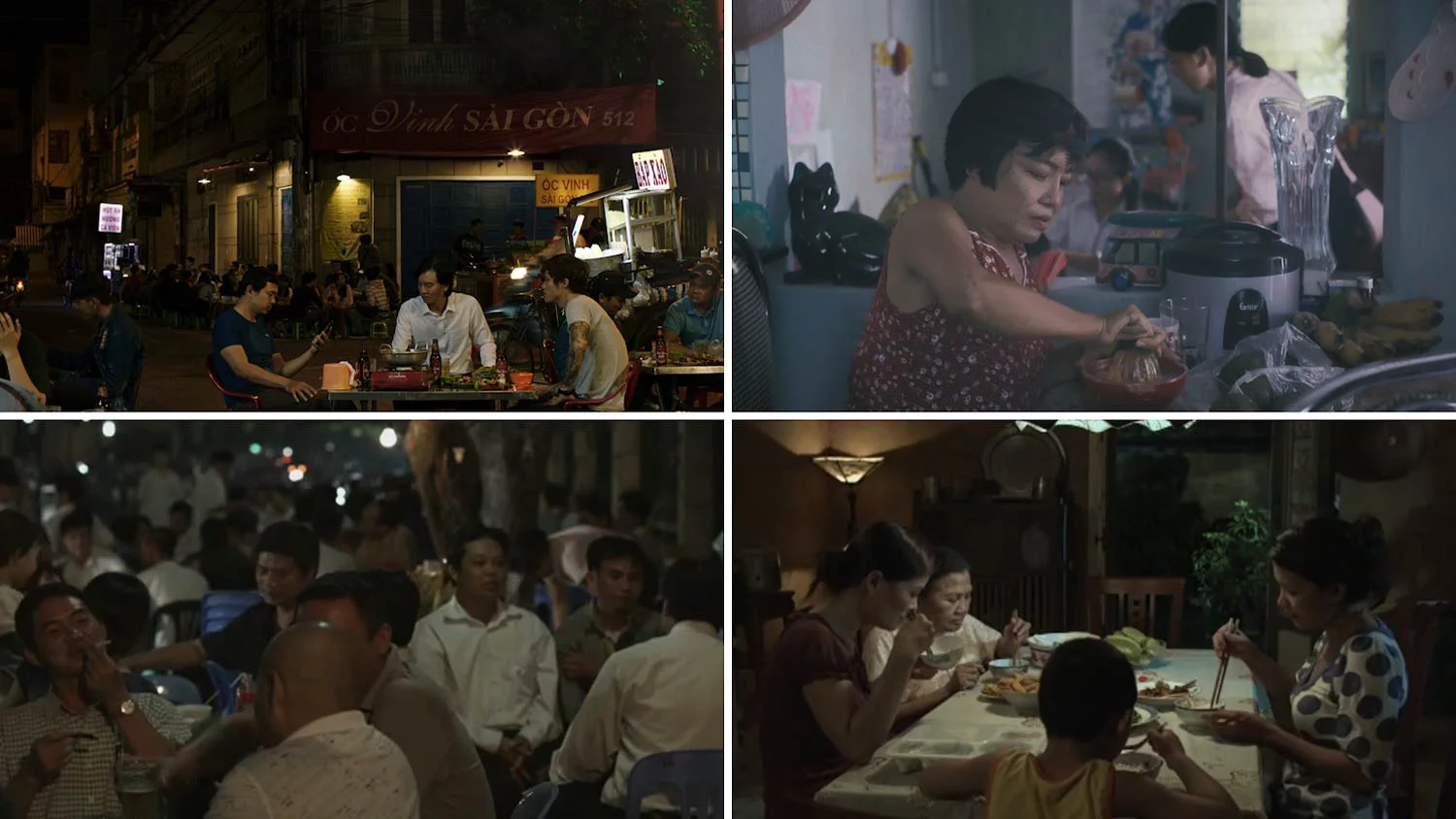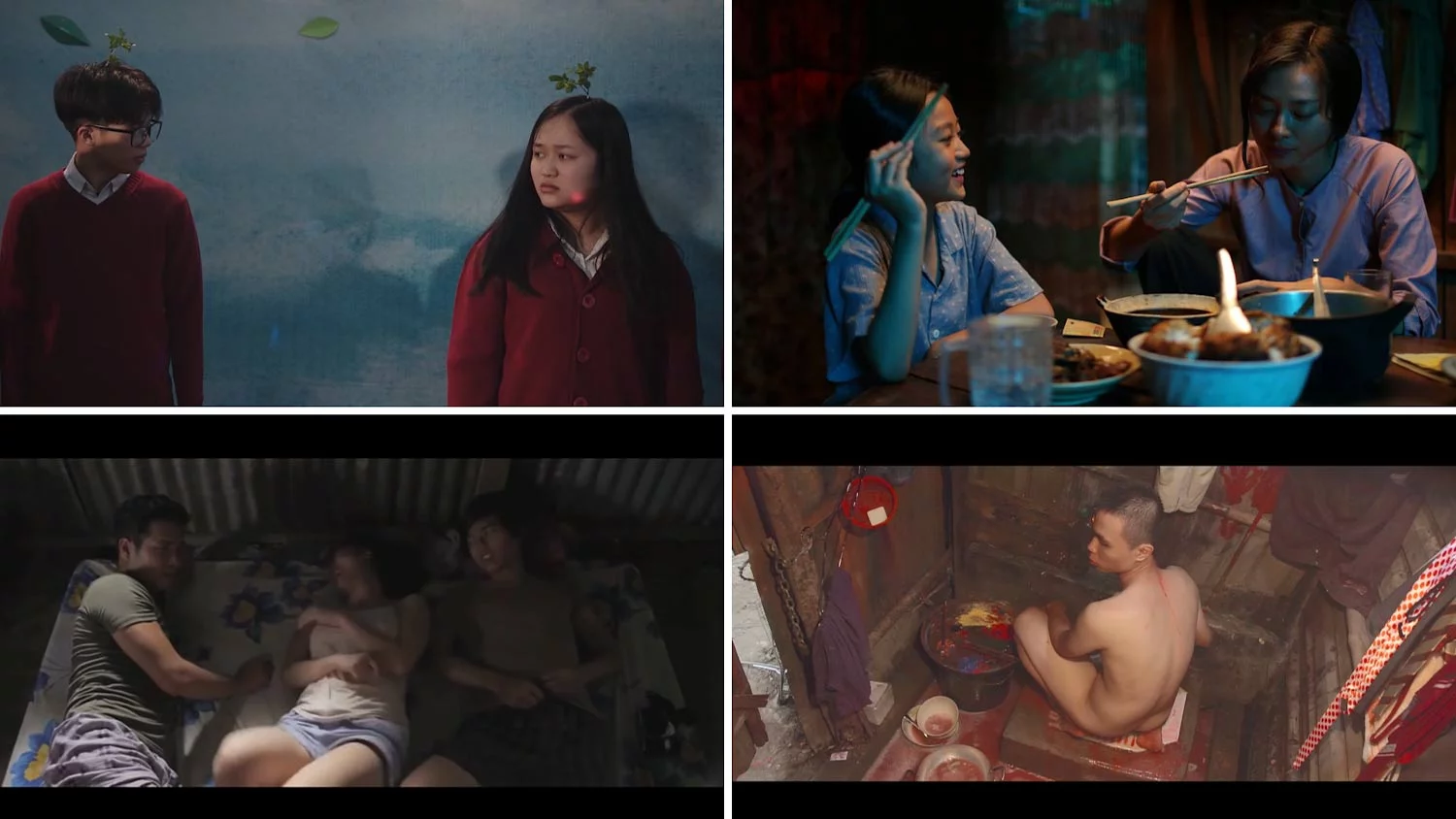Complicating Gender Through Vietnamese Short Films
By Dan Tran

Men are thus valued in relation to their intellect. The dynamics between the three men by the street stall in Stay Awake, Be Ready attests to this. The man who talks about metaphysics is arguably the most respected in the group, as his opinions are readily agreed upon by the other two. Meanwhile, the guy who chases after the boy who stole his banknote is chided for acting on impulse.
Conversely, women are judged by their appearance. The beer promoter in Stay Awake, Be Ready is strategically a young, pale-complexioned, long-haired female in suggestive clothes. This is to cater to the view of the male patrons with traditional Vietnamese standards of beauty. Women’s emphasis on vanity is also evident in Sweet, Salty. Ha prepares for the confrontation with her husband’s mistress not only by dressing up and wearing jewellery but also by visiting the beauty salon on the day before. Her motivation lies in wanting to look prettier than the mistress, in hopes of exerting her superiority.
Again, the time constraint disallows representing the entirety of the dichotomization of men and women along the intellect/appearance axis within a single short. The Scent of Green Papaya, unbounded by said delimitation, does exactly that. Women of the bourgeois families are almost always seen elaborately dressing up in áo dài, differentiating themselves from the servants in simple áo bà ba. Meanwhile, the elder brother of the family to which Mùi initially works for and his pianist friend engage in an intellectual pursuit of music writing and performance.
Ultimately, women see themselves through the eyes of men. This is the premise of Sweet, Salty, where the protagonist’s overall intent is to seek validation from her husband. By plotting the confrontation between herself, her husband, and his mistress, she hopes that the husband would come to realize her superiority over the mistress, who will give birth to a baby girl rather than Ha’s baby boy. The validation also comes from other females inhabiting the society permeated by patriarchal values. Hà’s mother and the salon staff regard Hà with more worth, knowing that she is bearing a son.
But the Vietnamese short films also disrupt these traditional and clinical representation of men and women. The ugly sides of men are exposed in Sweet, Salty: the infidelity of Ha’s husband, the irresponsibility of her son-in-law coming to pick up his child late, and inattention of the male construction worker to the correct phrasing of the Vietnamese proverb on the prediction of the sex of a child. Viewer can also find in Vo Anh Vu’s Gallery the foulness of men – the perverted gaze of a man at a damp dress, visualizing the owner in a state of undress; and the irresponsible drinking that led to a male character’s vomiting.

(from top left, in clockwise direction) (1) Stay Awake, Be Ready, dir. Phạm Thiên Ân, 2019. The beer promoter is strategically a young, pale-complexioned, dark-and long-haired female to cater to the male gaze. (2) Sweet, Salty, dir. Dương Diệu Linh, 2019. Hà and her mother visit a beauty salon on the day before confronting the husband’s mistress. (3) The Scent of Green Papaya, dir. Trần Anh Hùng, 1993. While Khuyến dedicates his time to writing and performing music, his girlfriend orbits around him in a pretty dress. (4) Gallery, dir. Võ Anh Vũ, 2019. A man is seen vomiting in the toilet, following a night of overdrinking.
Women, on the other hand, are presented with an attitude of incredulity and defiance towards social mores. The Graduation of Edison, directed by Phạm Hoàng Minh Thy, witnesses the sister’s resistance against the norm of chopping the tree from her head at her graduation. Unlike Hà of Sweet, Salty, she represents women as not merely acquiescent entities that unquestioningly obey duties and traditions. Instead, she exemplifies an autonomous female agent capable of thinking for herself. Of course, eventually she still cuts off the tree, but only after deliberation between her conflicting values of agency, tradition, and familial love.
Coming to terms with tradition in view of modern feminism is therefore a cornerstone of the identity of contemporary Vietnamese women. Many attempts at representing this double consciousness are present in the local film landscape, the most successful of which being films starred and produced by Ngô Thanh Vân. Her women-centric films are narrated by a female voice struggling to find autonomy in a society still pervaded by patriarchy. This can be seen in Furie – the first Vietnamese film available on Netflix. A patriarchal society that looks down on single mothers and women taking up violent jobs commonly associated with men sets the backdrop for the protagonist’s journey of rescuing her abducted daughter.
As much as women fight to be free of their traditional gender roles, men also seek to complicate their gender construction and the norm of masculinity. Gallery dismisses the representation of men as rational beings. By making the toilet and his own body a canvas for artistic expression, the artist in Gallery rejects the use of a toilet as a utilitarian space for washing.
Furthermore, the sentimental side of men is unveiled. A man is seen to caress a polka-dotted tie belonging another man, conjuring up sensuous imageries about the owner of the garment. This homoerotic undercurrent can also be read as a critique of the stifling force of heteronormativity. The story of Big Father, Small Father and Other Stories by Phan Đăng Di also runs along these lines, but with homoeroticism lying at the heart of the film.
Vũ, the protagonist, is torn between his attraction to his male flatmate and societal expectation of him to date and marry a woman.

(from top left, in clockwise direction) (1) The Graduation of Edison, dir. Phạm Hoàng Minh Thy, 2019. The sister runs away from her graduation ceremony, where the tree on her head would be cut. (2) Furie, dir. Lê-Văn Kiệt, 2019. The typical dining scene at home populated by women belies the norm-defying protagonist. (3) Gallery, dir. Võ Anh Vũ, 2019. The artist makes his body and the toilet a canvas for artistic expression, rejecting the utilitarian function of the space. (4) Big Father, Small Father and Other Stories, dir. Phan Đăng Di, 2015. Vũ is stuck in a love triangle resulted from his attraction to his flatmate and the latter’s sexual ambiguity.
It shouldn’t come as a surprise that the Vietnamese short films, when seen together, offer a layered depiction of gender. The entrenched Confucian values perpetuate patriarchal mindsets, while the country’s postcolonial and globalized identity raises issues about gender norms and heteronormativity. These divided ideologies necessarily inform the intent and behaviours of contemporary Vietnamese, who would need to then seek reconciliation between tradition and the prevailing modern worldviews.
– Dan Tran